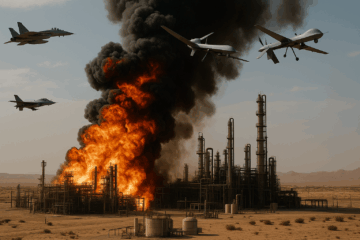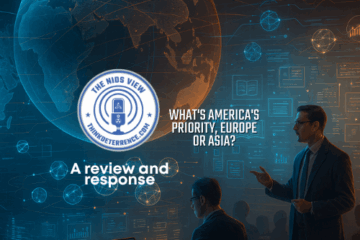The presidential campaign is heading into its climactic final months. Pundits and politicians are inevitably drawing analogies between present and past events in domestic politics and foreign policy.
This year, outbreaks of antisemitism across American college campuses, including at the most elite private colleges and universities, remind commentators of the turbulent year 1968. That year was marked by the assassinations of Martin Luther King, Jr., and Robert F. Kennedy, together with antiwar demonstrations at many colleges and riots at the Democrat National Convention in Chicago.
Some saw, in the upsurge of pro-Palestinian and anti-Israeli demonstrations a possible prelude to a similar upheaval at the Democratic National Convention in Chicago in August 2024. The Biden administration was under attack from its progressive wing and for its support of Israel in its war against Hamas in Gaza.
Democrat doubters about the administration’s foreign policy were already worried about the polls showing Republican presidential nominee Donald Trump competitive against Vice President Kamala Harris in the seven key swing states of Arizona, Georgia, Michigan, Nevada, North Carolina, Pennsylvania, and Wisconsin. And irony of ironies, Robert F. Kennedy, Jr., was running as a third-party candidate who might conceivably take away votes from either Biden or Trump—eventually withdrawing and throwing his support to Trump.
In 1968, Democrat dissidents and message malaise opened the door for Richard Nixon to come back from the graveyard of politics and win the White House. Would the Democrat Party recreate that debacle in 2024 and usher Donald Trump into the presidency for a second term?
Unfortunately for political prognosticators, 2024 is only superficially reminiscent of 1968. Pro-Hamas demonstrations on college campuses are not catching fire with the public as did antiwar protests in 1968. To the contrary, college presidents are under siege from various quarters for not doing enough to resist outbreaks of antisemitism and pro-Hamas demonstrations.
Jewish students feel unsafe on many college campuses, and parents of college students began to file lawsuits against schools that refuse to enact policies that protect Jewish students against harassment. In addition, a majority of American voters support Biden’s policy of favoring Israel’s right to defend itself against attack, while sharing some reservations about Prime Minister Benjamin Netanyahu’s approach to the war in Gaza. Not every criticism of Israel’s policy is antisemitism. As Israel moves toward the final stages of its campaign against Hamas, controversy will almost certainly surround its choice of military tactics and the costs of war for civilian noncombatants.
Given current events, the foreign policy center of gravity for the 2024 presidential campaign is not only the war in the Middle East, but also the war in Ukraine. The most recent tranche of American military assistance to Ukraine was held up in Congress by endless delays based on a variety of complaints from conservatives in the House. Speaker of the House of Representatives, Mike Johnson, ended this deadlock by agreeing with a majority of Democrats to pass legislation providing aid to Israel, Taiwan, and Ukraine in separate bills.
For his anti-isolationist temerity, Johnson was threatened by his House Republican colleagues with a vote to vacate the speakership as soon as practicable. Some House Republicans gave as their reason for opposing Johnson the absence of a companion bill providing additional funding for controlling the southern border. However, the problem at the border is not a lack of funding, but a fundamental policy disagreement between the Biden administration and its critics about whether to enforce existing immigration law and or allow the near-free flow of illegal aliens to enter the country.
The war in Ukraine, on the other hand, is a fundamental test of American resolve to defend the international order based on rules and expectations that preserved security and freedom in Europe from the end of World War II until well into the twenty-first century. Vladimir Putin’s war against Ukraine is an overt attempt to overthrow a legitimate government in Europe, based on reading history through a glass darkly and on ambition to restore Russian greatness as seen by its clique of siloviki, oligarchs, and propagandists.
Apologists for Russia attribute its belligerence to the North Atlantic Treaty Organization’s (NATO) post–Cold War expansion, the United States’ drive for unipolar dominance, and Ukraine’s illegitimacy as a unique culture and civilization. None of this may be true or original on the part of Russia. It is Aleksandr Dugin marinated in twenty-first century Moscow-centric geopolitics.
The tragedy is that Russia is a great civilization, with a history and culture that provided some of the world’s great literature, music, art, higher education, and excellence in professional military studies. Russia’s history is the story of an advanced civilization ruined by a succession of retro autocratic governments.
NATO has admirably rallied in the face of Russian military aggression by providing Ukraine with necessary military assistance, including weapons, intelligence, and training. But NATO has dragged this out to an extent that jeopardizes Ukraine’s ability to fight successfully even on the defensive, let alone on offense, for anything more ambitious than a military stalemate. Russia still hopes that an offensive before winter might turn the tide decisively against Ukraine—to the extent that the latter would have an insubstantial position for any post-conflict peace agreement.
Disparities between Russian and Ukrainian personnel- and military-related resources favor Russia as the war becomes more extended in time and space. Ukraine can only be saved by American and NATO firmness in the face of repeated threats of horizontal (extending military operations into NATO territory) or vertical (nuclear weapons) escalation. NATO’s combined gross domestic product is about thirty times that of Russia, but Russia has a far larger nuclear arsenal. Such problems all await the next president.
Therefore, the proper analogy is not between 2024 and 1968, but 2024 and 1938. Before the end of 1938, Germany had already crossed several red lines that anticipated an unlimited appetite for political coercion supported by the threat of military conquest. Then, as now, isolationists in the US and apologists for Hitler in Europe called for conciliation of Germany and appeasement of its demands. History never repeats itself exactly, as the saying goes, but it does rhyme.
The question for the United States and democratic Europe, now, as then, is not whether to resist aggression, but how and when. History suggests that tyrants’ appetite grows with the eating. The United States needs neither a return to its “unipolar moment” nor a willy-nilly reboot into forever wars among non-Western cultures. It does need to lead NATO’s resistance to Russia’s mistaken revanchism in Europe with smart strategy and politics until the climate improves for a viable peace settlement.
With regard to wars in the Middle East, the United States and its allies must also confront the foreboding reality of Iran’s wars against Israel, the United States, and the international order.
Iran’s instigation of Hamas’ attack against Israel on October 7, 2023, together with its support for proxy attacks on Israel and American troops elsewhere (Hezbollah in Lebanon, the Houthis in Yemen, and Iranian-supported terrorists in Iraq and Syria) has thus far met with less than intimidating responses. In addition to these failures in US and allied conventional deterrence, Iran is now a threshold nuclear weapons state potentially capable of threatening its immediate neighbors and targets outside the region.
An Iranian bomb could also stimulate Saudi Arabia and other Middle East powers to follow suit and destabilize the region. In addition, a nuclear Iran might pass nuclear materials and know-how to proxies for the construction of so-called dirty bombs or suitcase nukes. A nuclear Iran can destabilize the Middle East without firing a nuclear weapon.
Tehran can use the bomb for coercive diplomacy against Israel and other enemies, including threats of nuclear first use in response to any losses in a conventional war. In this respect, as well, 2024 may resemble 1938. Imagine Hitler with the bomb in 1938. A strategy of appeasement would have been far more appealing to political leaders in Britain and France, and a posture of isolationism to Americans—compared to what actually happened. Iran must be stopped by political negotiation or other means before it crosses this Rubicon.
Whether the world’s worst fears are recognized in the years ahead, as they were in and after 1938, or whether conflict is avoided will likely result, in large part, from the actions of the next president. This is a daunting future for either Kamala Harris or Donald Trump.
Stephen Cimbala, PhD is a distinguished professor at Pennsylvania State University—Brandywine and a Senior Fellow at the National Institute for Deterrence Studies. Views expressed are the authors own.
About the Author

Stephen Cimbala
Dr. Stephen Cimbala is Distinguished Professor of Political Science at Penn State university, Brandywine. He is currently a senior fellow with the National Institute for Deterrence Studies.





The “free flow” of immigrants is down substantially due in no part to Republcians who want problems to fester because it helps them get elected to do what they are paid for: Cut rich people’s taxes.
i sugest to counter putins agression mr cimbala join tyhe ukraine army. he probably will not do this because he is a cowerd
“We must all remind ourselves that rationality of superpower leaders, clear-eyed awareness of the supremely high stakes, installation of wise fail-safes, and healthy respect for “guardrails,””
Unfortunately, world leaders in the last few decades have almost uniformly been idiots…in particular, the USA, with a POTUS who is suffering from dementia, yet remains in office. Look at our current choices for his replacement; Trump or Harris. Harris is a congenital idiot, incapable of speaking a coherent sentence, and Trump is supremely self destructive. Relying upon eithers rationality or “clear eyed awareness” is whistling past the graveyard.
As an avid, contrarian. mostly-apolitical student myself of world military history and foreign relations, I agree with Dr. Cimbala’s take here: U.S. domestic politics since 1776, and especially since 1945, has deeply affected our national defense policies & actions — and our national defense decisions & outcomes have always had profound effects on domestic political controversies, too. Failed assumptions, cultural mirror-imaging, and internal divisiveness have always presented grave challenges, at great costs along the way, to our (so far) mostly-favorable results in major state-on-state conflicts. (Counterinsurgencies and brushfire wars, sadly, are another matter.) My own question lately has been whether the current world situation is more like 1938 or more like 1914? I’m thinking that, unfortunately, the answer is “Yes. Both.” Humanity might well be collectively sleepwalking — what with plentiful nuclear weapons and kinetic war in space both now on the table — into a cataclysm that escalates uncontrollably/inadvertently to become a irrecoverable catastrophe, one that is the (wildly expanded, and so much worse) analog of the blind march-of-armies into the senseless squalid endless slaughter of World War One. The ultra-high-tech nature of today’s and tomorrow’s threats does not change the fact that millions could die; rather it horrifically magnifies the possibility that the whole human species could die. We must all remind ourselves that rationality of superpower leaders, clear-eyed awareness of the supremely high stakes, installation of wise fail-safes, and healthy respect for “guardrails,” kept the First Cold War from turning into a nuclear holocaust. Many pundits, including yours truly, see today’s CRINKs nuclear brinkmanship, nationalist/militaristic belligerence, and unrelenting malign influence information warfare, as ignoring those critical lessons learned. The bad guys this go-round are tempting fate far to close to the edge of The Abyss. I agree with Dr. Cimbala that, whatever the outcomes of Election Day 2024, America’s people and our leaders have our work cut out for us to protect our freedom and world peace.